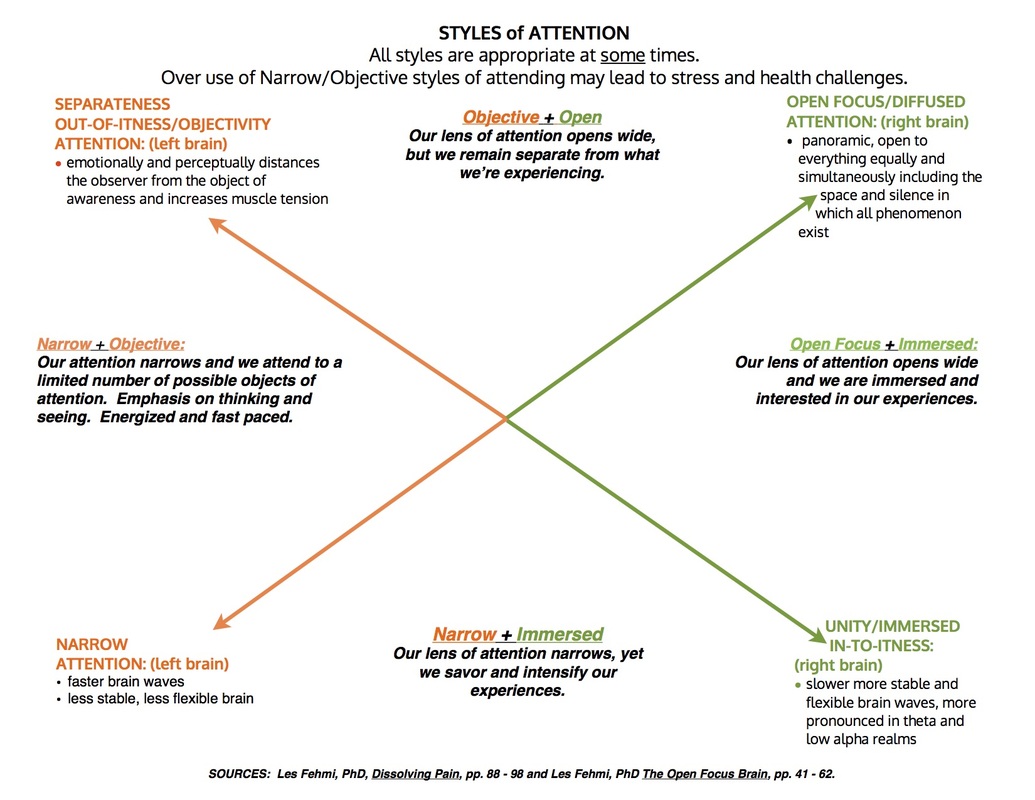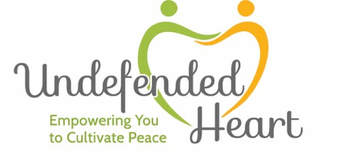How and to what are you paying attention?
And why does it matter?
- What happens when you give attention to attention itself,
- instead of the objects to which attention gets glued?
- What happens when you fully experience your personhood,
- including both your humanness and your being?
- What happens when you notice how you are paying attention?
Veteran researcher, psychologist and neurofeedback clinician, Les Fehmi, PhD has identified four main styles of attention: diffuse, narrow, objective and immersed.
When each unique style is employed,
your physical, emotional and mental experiences are impacted.
The way you pay attention can determine whether you're experiencing judgment or acceptance, feeling hurried or spacious, anxious or calm, preoccupied or unself-conscious.
Your experiences and feelings translate into health outcomes and behaviors, which then also directly impact the body and the quality of your relationships, your ability to learn, your creativity and your productivity.
That's because the way you pay attention determines the frequency of your brain's activity (low, mid or high beta; alpha; theta or delta). High beta activity is an emergency mode of attention, resulting from a narrow-objective style of focus that "is correlated with tense muscles, anger, anxiety and other intense emotions." (Fehmi, Dissolving Pain, p. 94) Many people's default style of attending is that narrow-objective style.
Undefended Heart's programs pair these findings with the phenomenon of closing down to yourself or others -- of defending yourself emotionally and or psychologically within a comparative paradigm of right or wrong, better or best.
In other words, moving out of the emergency mode of narrow-objective attention also leads to openhearted-ness, freedom and ease of being --
because we assist you in retraining your brain to use the full capacity of your perceptual, response-ability.
Imagine the implications:
for you, for your family, for your workplace or school/university setting,
for dialogue with others, for peace in the world!
Why?
Because attending only with a narrow-objective lens,
creates inherent bias because we are not attending fully to our entire experience.
For example, when you're talking or in conflict,
if you narrow focus on your own feelings
or are thinking about how you're going to defend yourself
in light of what's being shared,
you miss the full content and multi-dimensional nature of the communication.
It's like you've focused your lens on only a small section of the picture
instead of taking in the wider, fuller, more accurate view.
What are the applications?
Styles of attention reflect not only in the body
but they reflect and inform your behavior and decisions.
Those decisions determine your outcomes.
A globally attentive style of attention is, by its nature, inclusive.
Learn more about applications, for your setting:
At Undefended Heart, we'll teach you how to live and move from the places within you that respond instead of react, both within your brain's neural circuitry and the aspect of yourself that is always open, always available: your "being."
You'll become conscious (instead of unconscious and reactive), making choices -- versus acting and reacting from auto pilot.
You'll become conscious (instead of unconscious and reactive), making choices -- versus acting and reacting from auto pilot.

© Barbara Veale Smith, 2016. All rights reserved.

